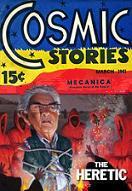My series of posts on the critics of Thomas Nagel’s Mind and Cosmos has gotten a fair amount of attention. Andrew Ferguson’s cover story on Nagel in The Weekly Standard, published when I was six posts into the series, kindly cited it as a “dazzling… tour de force rebutting Nagel’s critics.” Now that the series is over it seems worthwhile gathering together the posts (along with some related materials) for easy future reference.
First there was my review of Mind and Cosmos for the online edition of First Things, wherein I described the respects in which Nagel’s position constitutes a return to something like the Aristotelian understanding of the natural world that the early modern philosophers thought they had overthrown for good.
Then began the series proper, entitled “Nagel and his critics,” wherein I responded to the most influential reviews of Nagel’s book. Most of the critics approach Mind and Cosmos from the point of view of philosophical naturalism, but I also responded to some theist critics of Nagel. The series had ten parts, with some supplementary posts along the way:
Part I: Here I present some criticisms of my own, noting how Nagel has needlessly opened himself up to certain objections and other respects in which his book could have been stronger.
Part II: Here I respond to the objections raised fairly aggressively by naturalist philosophers Brian Leiter and Michael Weisberg in their review of Nagel in The Nation. I argue that Leiter and Weisberg misinterpret Nagel, beg the question against him, and in other ways utterly fail to justify their dismissive approach to the book.
Part III: This post addresses the more measured response to Nagel presented by Elliott Sober in his review in the Boston Review.
Part IV: Here I comment on Alva Noë, who responded to Nagel at his NPR blog and who is, among Nagel’s naturalist critics, perhaps the most perceptive and certainly the least hostile. (In a follow-up post I commented on some later remarks made by Noë on the subject of Nagel and the origin of life.)
Part V: This post responds to the very hostile remarks about Nagel made by John Dupré in Notre Dame Philosophical Reviews. I argue that, like Leiter and Weisberg, Dupré has simply missed the point and failed to address Nagel’s position at the deepest level.
Part VI: Here I respond to the serious and measured criticisms of Nagel raised by Eric Schliesser at the New APPS blog. (In a follow-up post I comment on Schliesser’s remarks about Alvin Plantinga’s “Evolutionary Argument Against Naturalism,” which Nagel cites approvingly.)
Part VII: This post responds to Mohan Matthen, who reviewed Nagel’s book in a serious and measured way in The Philosophers Magazine and has also commented on it at the New APPS blog.
Part VIII: Here I reply to Simon Blackburn’s review of Nagel in New Statesman. As I note in the review, Blackburn is fairer to Nagel than he is sometimes given credit for.
Part IX: Here I comment on a symposium on Nagel’s book in Commonweal magazine, which included pieces from philosopher Gary Gutting, biologist Kenneth Miller, and physicist Stephen Barr. Unlike some other reviewers, these three are not writing from an atheist perspective.
Part X: In this final post in the series, I respond to some other reviewers writing from a theistic point of view -- specifically, Alvin Plantinga (who reviewed Nagel’s book in The New Republic), J. P. Moreland (who reviewed it in Philosophia Christi), John Haldane (who wrote on Nagel in First Things), and William Carroll (who commented on Nagel over at Public Discourse).
All of the criticisms of Nagel I deal with in the series are substantive even when polemical. However, there has (needless to say) been much completely frivolous commentary on Nagel in the less sophisticated corners of the atheist blogosphere. I responded to some silly remarks made at EvolutionBlog by Jason Rosenhouse here, with a follow-up post here.
Nagel’s Mind and Cosmos is an opposite bookend of sorts to Alex Rosenberg’s recent The Atheist’s Guide to Reality. Both Nagel and Rosenberg are naturalists, but both are also highly critical of their fellow naturalists -- who, Nagel and Rosenberg maintain, do not see the deep metaphysical problems afflicting the complacent materialism that prevails among contemporary philosophers (and among contemporary scientists in their philosophical moods). What Nagel and Rosenberg disagree about is the prescribed remedy. For Rosenberg, to be a consistent naturalist requires being a radical eliminativist -- denying the existence of intentionality and semantic meaning, the epistemic value of introspection, and so forth. For Nagel, salvaging naturalism requires going to almost the opposite extreme of reviving the Aristotelian teleology that naturalists have for centuries been defining themselves against.
What is remarkable to me is how far Nagel and Rosenberg unwittingly recapitulate some of the central arguments of my book The Last Superstition (some of which are restated without the polemics in Aquinas). As I have argued there and elsewhere, naturalism cannot in fact be salvaged. It either collapses into Rosenberg-style eliminativism, which is (hard as Rosenberg tries to make it work) ultimately incoherent; or, in order to do justice to the aspects of reality that even many of Nagel’s critics acknowledge to be irreducible, is either transformed into the panpsychism of Whitehead, Chalmers, and Strawson, or entails a return to an essentially Aristotelian-Scholastic philosophy of nature that is far more thoroughgoing than even Nagel is probably willing to accept.
Anyway, I have commented on Rosenberg at length in a long series of posts on his own book:
Questions about scientism and the mind-body problem are absolutely central to Nagel’s and Rosenberg’s arguments. I have addressed those topics too in a number of posts, which are collected here:





















